With Perfecto 25.11 (released on September 28, 2025), you gain new ways to streamline and strengthen your test automation. You can now run Playwright tests across real browsers in the cloud and use Selenium to automate legacy web apps in Internet Explorer mode within Edge. If you're using Scriptless Mobile, you'll benefit from several enhancements: AI User Actions now support secured string variables to protect sensitive data and default to a stricter error policy that stops execution on failure. Additionally, new Public API endpoints let you monitor and manage test executions triggered by AI commands. You can also automate device language changes, enjoy smoother backspace responsiveness on real devices, and test on newly supported platforms, including iOS 26, iPhone 17 devices, Android QPR2 Beta 1, macOS Tahoe, and the latest browser versions. Support for Appium 1, macOS Monterey, and Flutter integration will end soon, so be sure to plan your upgrades accordingly.
On this page:
Playwright testing with Perfecto
You can now integrate Playwright, Microsoft’s open-source end-to-end testing framework, with Perfecto to run your Playwright tests across real browsers in the Perfecto cloud.
This integration supports Java, JavaScript, and TypeScript and includes optional setup for PerfectoSmart Reporting, giving you access to detailed execution reports directly in the Perfecto UI.
By combining Playwright’s modern automation capabilities with Perfecto’s scalable cloud infrastructure and reporting tools, you can:
-
Expand test coverage across browsers and devices
-
Accelerate debugging with centralized execution reports
-
Maintain consistency across environments with cloud-based execution
To learn more and get started, see our Playwright documentation.
Secured string variable support in AI User Actions
You can now use the Secured String variable type as part of the AI User Action command to create secure variables that protect sensitive values, such as passwords, by preventing them from appearing in the Smart Reporting UI.
Previously, variables of this type were ignored during reporting, and their values were visible in the resulting test reports. This update ensures that Secured String values are now properly masked when working with AI User Actions.
To learn more, see Perform AI-driven user actions.
Scriptless Mobile enhancements
In this release, Scriptless Mobile includes the following enhancements.
Change to default error policy for AI User Action command
The AI User Action command in Scriptless Mobile now defaults to a stricter error policy for newly added commands. Previously, the default value for the On-fail Result parameter was Ignore, which allowed test execution to continue even if the command failed. This behavior was inconsistent with the critical nature of user actions in test flows.
To improve test reliability, the default On-fail Result is now Abort. When the command fails, test execution will stop, ensuring that failures in essential steps do not go unnoticed.
This change applies only to new AI User Action commands added to a test. Existing commands will retain their previously configured behavior unless manually updated.
To learn more, see AI User Action command and AI user action (FR).
New API endpoints
Perfecto has introduced the following new endpoints to the Scriptless Mobile Public API:
-
Get test execution status: Gets the status of the running or recently completed execution specified by the
<executionId>. The<executionId>is the execution identifier returned by the Start test execution operation. -
Get test executions list: Gets the status of the running or recently completed executions matching the specified filter parameters. All executions in the last 24 hours are available.
Authentication is handled using the standard Perfecto method via the Perfecto-Authorization header.
The Scriptless Mobile Public API is currently available to customers who have licensed the Perfecto AI feature: If your Scriptless Mobile instance includes Perfecto AI commands or the Execute JavaScript command command, other script operation endpoints are not available.
To learn more, see Scriptless Mobile Public API.
Device language automation
You can now automate language changes on mobile devices using either of the following methods:
-
Preferred method: Use the new Perfecto capability
perfecto:deviceLanguagein your Appium script. This sets the device language at session start, allowing tests to begin immediately in the desired language. It does not require a reboot and preserves the Appium session. -
Alternative method: Use the new Perfecto extension
perfecto:language:set. This changes the device language but reboots the device, which ends the current Appium session. You must start a new session to continue testing.
The following language codes are supported:
ar-AE, zh-Hans-CN, en-US, fr-FR, fr-CA, de-DE, he-IL, it-IT, ja-JP, ko-KR, pt-BR, ru-RU, es-ES
This enhancement helps you streamline test setup and run consistent localization tests across supported languages.
To learn more, see Set the device language using automation.
IE mode testing in Edge with Perfecto
Some enterprise websites still rely on legacy features that are only supported in Microsoft Internet Explorer. Modern browsers like Microsoft Edge offer an Internet Explorer Mode to maintain compatibility with these sites.
Perfecto now supports Selenium automation for Internet Explorer mode in Edge on Windows machines. This allows you to test legacy web applications without switching browsers or compromising automation coverage.
To enable Internet Explorer mode in your Selenium scripts, you need to set the browerName capability to Edge and the ie-mode capability to true.
For more information, see Use Internet Explorer mode in Edge in Selenium tests and Reference for capabilities in Perfecto.
Improved backspace key responsiveness
Perfecto now delivers a smoother, more natural experience when using the backspace key during real device interactions. This action is optimized to match the pace of fast typing, ensuring immediate visual feedback and eliminating delays or buffering effects. This enhancement helps you maintain flow and precision when editing input fields.
End of support notice: Script execution with Appium 1
As of December 21, 2025, Perfecto will no longer support script executions with Appium 1. Only Appium 2 will be supported for all executions going forward. The default version will be 2.19, with 2.4.1 available as a fallback.
This change also impacts the following:
-
Selenium executions: With the deprecation of Appium 1 executions, Perfecto is also deprecating Selenium 3 executions. Only Selenium 4 server will be used going forward. Therefore, it is required to use a Selenium client library compatible with Selenium 4 server:
-
Recommended version of Selenium client: 4.x
-
Minimal version of Selenium client: 3.9 or later
Using this version may limit full support of Selenium 4 features.
-
-
Appium executions on virtual devices: Appium executions on virtual devices will be affected starting December 21, 2025, when support for Appium 1 executions ends. Until that date, Appium executions on virtual devices remain unaffected.
To control which Appium version is used for virtual device executions, you can set the
appiumVersioncapability. The default version for these executions is currently 1.22.3.For a full list of supported Appium versions for virtual device executions, see Supported platforms > Device platforms > Virtual devices.
Moving to Appium 2 is expected to provide long-term value and reliability to your automation strategy. The Perfecto Support team is available to assist with this transition.
To learn more, see the following articles:
EOL notice: macOS Monterey
With the release of and support for macOS Tahoe, macOS Monterey is now deprecated. Based on Perfecto’s suspension of support policy for desktop web operating systems, it will be End of Life (EOL) as of December 31, 2025. After this date, devices running Monterey will no longer be available in Perfecto.
For details about the Perfecto support policy, see Suspension of support policy | Desktop web OS.
To explore upgrade options, contact Perfecto Support.
EOL notice: Flutter
Support for the Perfecto integration with Flutter will end on November 20, 2025. You can continue to use Flutter for application development, but testing must be conducted with Appium, using either the Appium Flutter Driver or the Appium Driver Flutter package.
Platform support | Real devices
This release introduces the following enhancements and updates to real device support.
New iOS versions
You can now test your applications on real devices running the following iOS versions:
-
26.1 Beta 1 and 26.0 GA
Devices running an iOS 26.0 version require a cloud with HSS 2.0 and macOS Sequoia. If you are interested in having iOS 26.0 devices connected in your cloud, contact Perfecto Support.
-
18.7 GA
-
16.7.12 GA
Versions 16.7.8 GA and later are only intended for older devices that do not support iOS 17.
-
15.8.5 GA
Versions 15.8 GA and later are intended for devices in the iPhone 7 series only.
For complete support information, see iOS support updates.

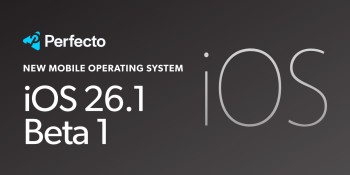
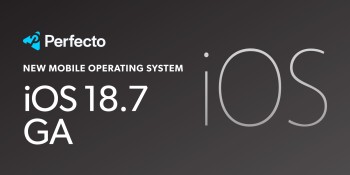
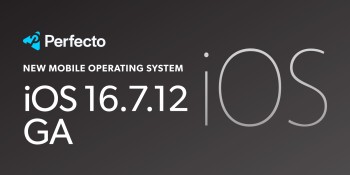
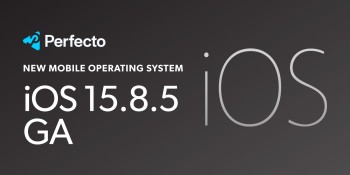
New iPhone 17 series
Perfectonow supports testing on Apple’s newly released iPhone 17 devices, including iPhone 17, 17 Air, 17 Pro, and 17 Pro Max. To get started, contact Perfecto Support.
Connecting iPhone 17 devices currently involves a brief cloud downtime. After the downtime, all devices that use a passcode will need to be reopened.
For a complete list of supported devices, see Supported Devices.

macOS Tahoe
Perfecto now supports macOS Tahoe for desktop web testing. This operating system is currently available for private clouds upon demand. If interested, contact Perfecto Support.
For a complete list of supported operating versions, see Supported platforms.
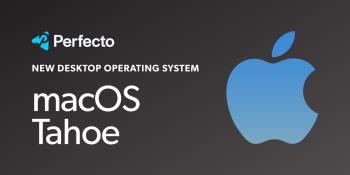
Platform support | Virtual devices
This release introduces the following enhancements and updates to virtual device support.
New iOS versions
You can now test your applications on virtual devices running the following new versions:
-
iOS 26.1 Beta 1
This version is supported at limited capacity.
Support for pre-release versions of virtual devices is available at limited capacity per region. Because access is based on a shared pool, availability may vary. If you find that availability does not meet your testing needs, contact Perfecto Support.

-
iOS 26.0 GA

For an updated list of devices and versions, see Supported simulator devices and OS versions.
New iPhone 17 simulator devices
With support for iOS 26 GA, the following new simulator devices are now available:
-
iPhone 17
-
iPhone 17 Pro
-
iPhone 17 Pro Max
-
iPhone Air
For an updated list of devices and versions, see Simulators (iPhones and iPads).
New Android versions
You can now test your applications on emulators running Android QPR2 Beta 1. This version is supported in all regions and at full capacity.
In the Perfecto UI, Android QPR2 Beta 1 appears as version 16.0. This is distinct from version 16, which refers to the Android 16 GA release.
For general advisories and known issues related to Android QPR2 Beta 1, see the Android developer release notes.
For an updated list of devices and versions, see Supported emulator devices and OS versions.
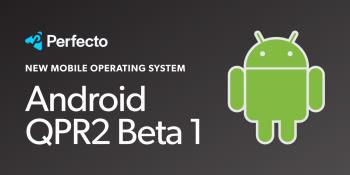
Browser support
You can now test your applications in the following new browser versions on Windows and Mac machines:
-
Google Chrome 140 Stable and 141 Beta
-
Mozilla Firefox 143 Stable and 144 Beta
-
Microsoft Edge 140 Stable and 141 Beta
For a complete list of supported browsers, see Supported platforms.





